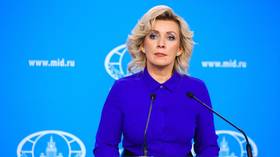Russia accuses US of double standards in Balkans

The US only advocates territorial integrity when it suits its own agenda, Russian Foreign Ministry spokeswoman Maria Zakharova has argued. Her comments came after Washington criticized Bosnian Serb leader Milorad Dodik for his supposed secessionist ambitions.
Zakharova insisted that the US had no issue with undermining Serbia’s territorial integrity when Washington recognized the breakaway province of Kosovo as independent back in 2008.
In a Friday post in her Telegram channel, she addressed her counterpart in the US State Department, Ned Price, writing: “Unbelievable. Ned, try replacing ‘BiH [Bosnia and Herzegovina]’ with ‘Serbia,’ ‘the Republika Srpska’ with ‘Kosovo,’ ‘the Dayton Peace Agreement’ with the ‘UN Security Council Resolution 1244’ and you get a diagnosis – split personality disorder.”
The Russian diplomat claimed that in 2008, Washington rode roughshod over the UN Security Council after a resolution which, among other things, reaffirmed the “commitment of all Member States to the sovereignty and territorial integrity of the Federal Republic of Yugoslavia” and called for “substantial autonomy and meaningful self-administration for Kosovo.”
Having signed up to this ruling, the US still “recognized Kosovo’s independence, violating the territorial integrity and sovereignty of the multinational Serbia,” Zakharova insisted.
Earlier on Friday, Price expressed concern over remarks made the previous day by Dodik, the president of Republika Srpska – one of Bosnia and Herzegovina’s constituent parts. According to the US official, Dodik “made repeated threats about the Republika Srpska’s secession from Bosnia and Herzegovina.”
In a press statement, Price was quoted as claiming that the Bosnian Serb leader had used “separatist rhetoric and threats to the Dayton Peace Agreement” – which he described as “irresponsible” and “dangerous.”
In contrast, the State Department official hailed the “Euro-Atlantic” stance of the Bosnian authorities and pledged to “continue to uphold BiH’s sovereignty, territorial integrity, and multiethnic character.”
Price also warned that Washington would “hold responsible those who seek to undermine BiH’s institutions and the Dayton Peace Agreement.”
Bosnia and Herzegovina in its current form declared independence in 1992 amid the turbulent dissolution of the Socialist Federal Republic of Yugoslavia, following a referendum which was boycotted by Serbs. A bloody war between different ethnic and religious groups ensued, with the Dayton Agreement brokered between the then-leaders of the Republic of Serbia, Croatia, and Bosnia and Herzegovina putting an end to it three years later.
At present, the country is made up of the predominantly Serb-populated Republika Srpska and the mainly Croat-Bosniak-populated Federation of Bosnia and Herzegovina.













